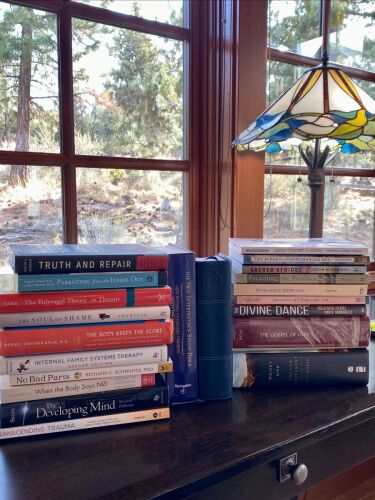 How do you feel about decision-making?
How do you feel about decision-making?
Would you rather eat jello salad on Thanksgiving than be stuck trying to decide among options? Or, are you “decisive” by nature—someone who readily chooses and moves on?
I typically fall into the “decisive” category.
But as I’ve been contemplating a complex situation over the past month, I’ve realized that there’s a category of decisions that can stymie most of us.
I call it the “Should I stay or should I go?” category. These decisions arise in relationships, organizations, vocations, ministries, and spiritual communities—the most important contexts of our lives.
If we are wondering if it’s time to move on, something significant happened. Or, more likely, there were a series of things that combined to cause you to question whether you can be authentic and vulnerable in a particular space.
Is the confusing jumble of thoughts, emotions, and impulses an invitation to dig in so you can withstand a stormy phase in the relationship or situation? Or are your internal signals suggesting this is no longer a place where you can grow because the harsh winds are destructive?
These decisions are complex, so they provoke many responses from our internal family members.
We’ll hear from opposing sides—those who favor staying and those who say go. It’s essential to spend time with both camps; each of them has valuable perspectives.
But that’s not all that’s going on.
Because there’s a lot at stake, chances are you are feeling some intense emotions—grief, anger, loneliness, or shame. Protective members of our internal family are worried that we will be overwhelmed if we welcome these emotions.
Our protectors are hard-working, committed members of the inner family. Too often, they are dismissed or criticized. But they mean well, no matter their strategy for protecting us. Turning toward them with gratitude is transformative.
When you connect with the worriers, they will relax and allow you to communicate with the parts holding intense emotions.
These tender parts of you feel confusion or shame as they wonder, “Why don’t I fit in? Everyone else seems fine. What’s wrong with me?”
Or they feel grief anticipating loss: “What will happen if I leave? Will I be alone? Will I find another place or person where I feel safe and seen?”
If you’ve been betrayed or gaslighted, part of you could be filled with anger—even rage.
You have the God-given resources they need for healing. Compassion soothes self-doubt. Loving presence reassures them they will never be alone. Courage offers them a safe space to express their anger.
Connecting with your inner family’s protective and vulnerable members opens space for clarity. Your decision will unfold as you patiently and persistently create space for all voices to be heard—including God’s still, small voice.

 How do you feel about decision-making?
How do you feel about decision-making?


Leave A Comment